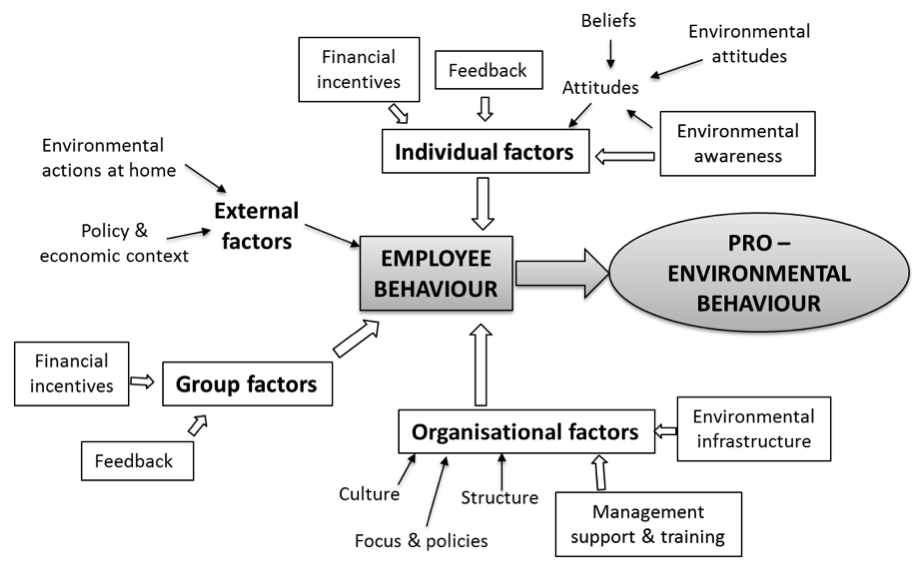
Improving environmental performance remains a key concern for many organisations, with consumer and NGO expectations regarding sustainability increasing. Whilst much attention has focussed upon adopting new technologies, supply chain innovations and production efficiencies, there has been a growing appreciation of the role that individual employees may play in reducing the environmental impact of an organisation’s activities.
Organisations and academics have experimented with a wide array of different techniques (e.g., information campaigns, rewards, goal-setting) to interest and engage staff in sustainable activities and work practices (e.g., use of recycling bins, changes to how they use equipment, travel to work, purchasing decisions etc.). There has been a good number of studies published detailing the results of these individual interventions, but it has often been difficult to distinguish what the most effective techniques are for changing behaviour within the workplace. We, together with colleagues, undertook a review of the available evidence, focussing on studies that measured actual changes in behaviour or environmental impact, rather than relying on subjective self-reports.
Our work suggests that the key approaches to encourage staff to act in more environmentally sustainable ways are:
- building environmental awareness (helping staff understand the issues and what they can do to help);
- providing performance feedback (connecting staff to the impact of their actions, e.g., providing real-time energy use);
- offering financial incentives (e.g., a share of cost savings from waste reduction, prizes for participation);
- environmental infrastructure management support and training (e.g., how to use equipment, devices and buildings efficiently – often there can be a knowledge gap).
Perhaps surprisingly, given the attention that changing staff attitudes has received (e.g., persuading people to change their views on the environment), one of our key findings was that attitude change is not necessarily a pre-requisite for behaviour change. In other words, it does not seem to be necessary to win, for example the climate change argument in order to achieve changes in pro-environmental behaviour. We have found that pro-environmental behaviour change may be achieved when employees are aware of environmental issues/policies and are provided with the practical or procedural knowledge regarding sustainable actions, even in the absence of techniques directed at attitude change. For example, once an employee knows why and how to switch off machines at the end of shifts they may do so even without having pro-environmental attitudes because of the work structure, systems, culture and rewards for doing so.
We have summarised our findings in the figure below. Our framework goes beyond similar efforts that have only looked at a single environmental behaviour (e.g., waste) and considered the conditions that may support pro-environmental behaviour in its broader sense. By concentrating our analysis on interventions and activities that achieved measurable environmental change, practitioners can have increased confidence that the factors identified as efficacious have demonstrable practical impact. This will, in our view, create conditions for changes in behaviour and as a consequence, improvements in organisational environmental performance.
Figure 1: e-PEB framework for changing employee environmental behaviour (Young et al, 2014). Factors that have strong evidence are boxes and arrows shown with emphasis.
Our review suggests four key learning points for managers and practitioners seeking to encourage more environmentally sustainable behaviours within their organisations.
- Training and information should focus on building environmental awareness, rather than changing staff attitudes towards the environment. Furthermore a focus at the group-level as well as individual-level may be more effective. Although this may be more resource intensive it has been shown to be effective in areas such as quality and safety.
- Traditional financial and non-financial reward structures in the organisation should incorporate, and be focused towards, environmental issues, which will incentivize the majority of employees rather than the already motivated minority.
- Environmental responsibilities should be incorporated into organisational management structures so that employees see that these are important to the organisation and to their own line-manager.
- The biggest task sustainability teams/consultants/managers should take responsibility for is the feedback of environmental performance data to the group-level and the individual-level. These data should not be just general organisational-level performance, but rather be focused on each group and if possible also to specific individuals. The individual focus could be on managers, team leaders and staff in key roles, such as buildings’ operational staff, operators of key equipment and HRM staff.
It is clear to us that the likelihood of successful pro-environmental behaviour change is likely to come where organizations integrate sustainability or CSR programmes into core business functions such as Human Resource Management and organizational management structures. Making use of existing structures and processes to support staff and reinforce key messages seems key if we wish to engage the majority of the workforce rather than just speak to those individuals who are already commited to the environmental cause.
♣♣♣
Notes:
- This post is based on the authors’ paper Changing Behaviour: Successful Environmental Programmes in the Workplace, co-authored with Ilona M. McNeil, Bindu Malhotra, Sally Russell, Kerrie Unsworth and Chris W. Clegg, in Business Strategy and the Environment, 24(8), 689-703. doi: http://dx.doi.org/10.1002/bse.1836
- The post gives the views of its author, not the position of LSE Business Review or the London School of Economics.
- Featured image credit: Phil Whitehouse CC-BY-2.0
- Before commenting, please read our Comment Policy
 William Young is Professor of Sustainability and Business and Co-Director of the Sustainability Research Institute at the University of Leeds. His research is focused on consumer behaviour around sustainability issues. He develops theoretical frameworks and applied tools that understand and change consumer behaviour in purchasing and using products and services. The frameworks and tools use indicators to show measurable reductions in environmental and social impacts. Professor Young co-organises the annual Corporate Responsibility Research Conference along with Kedge Business School in France and is Co-Investigator of the ESRC Consumer Data Research Centre.
William Young is Professor of Sustainability and Business and Co-Director of the Sustainability Research Institute at the University of Leeds. His research is focused on consumer behaviour around sustainability issues. He develops theoretical frameworks and applied tools that understand and change consumer behaviour in purchasing and using products and services. The frameworks and tools use indicators to show measurable reductions in environmental and social impacts. Professor Young co-organises the annual Corporate Responsibility Research Conference along with Kedge Business School in France and is Co-Investigator of the ESRC Consumer Data Research Centre.
 Matthew Davis is a Lecturer in Leeds University Business School’s Management Division. He is a Chartered Psychologist and Associate Fellow of the British Psychological Society. His expertise lies in organizational and environmental psychology, particularly the design of the physical environment and pro-environmental behaviour change. He has been working with clients such as Rolls-Royce, Arup Consulting and British Gas. He was awarded the 2010 US Academy of Management “Making Connections” award recognising contributions that cross-disciplinary, international and practitioner – academic divides. Dr Davis is a member of the Editorial Board for Corporate Social Responsibility and Environmental Management, and an elected member of the US Academy of Management’s Greening Team.
Matthew Davis is a Lecturer in Leeds University Business School’s Management Division. He is a Chartered Psychologist and Associate Fellow of the British Psychological Society. His expertise lies in organizational and environmental psychology, particularly the design of the physical environment and pro-environmental behaviour change. He has been working with clients such as Rolls-Royce, Arup Consulting and British Gas. He was awarded the 2010 US Academy of Management “Making Connections” award recognising contributions that cross-disciplinary, international and practitioner – academic divides. Dr Davis is a member of the Editorial Board for Corporate Social Responsibility and Environmental Management, and an elected member of the US Academy of Management’s Greening Team.






